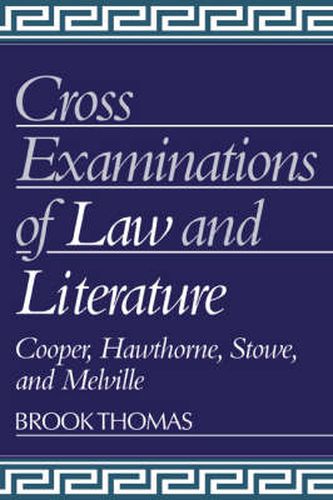Readings Newsletter
Become a Readings Member to make your shopping experience even easier.
Sign in or sign up for free!
You’re not far away from qualifying for FREE standard shipping within Australia
You’ve qualified for FREE standard shipping within Australia
The cart is loading…






In Cross Examinations of Law and Literature Brook Thomas uses legal thought and legal practice as a lens through which to read some of the important fictions of antebellum America. The lens reflects both ways, and we learn as much about the literature in the context of contemporary legal concerns as we do about the legal ideologies that the fiction subverts or reveals. Successive chapters deal with Cooper’s Pioneers and Hawthorne’s The House of Seven Gables (property law and the image of the judiciary), Melville’s Benito Cereno and Stowe’s Uncle Tom’s Cabin (slavery), Melville’s White Jacket, Pierre and Bartleby (worker exploitation or wage slavery), The Confidence-Man (contracts), and finally, Billy Budd, which examines a number of issues illustrative of the triumph of legal formalism after the Civil War.
$9.00 standard shipping within Australia
FREE standard shipping within Australia for orders over $100.00
Express & International shipping calculated at checkout
In Cross Examinations of Law and Literature Brook Thomas uses legal thought and legal practice as a lens through which to read some of the important fictions of antebellum America. The lens reflects both ways, and we learn as much about the literature in the context of contemporary legal concerns as we do about the legal ideologies that the fiction subverts or reveals. Successive chapters deal with Cooper’s Pioneers and Hawthorne’s The House of Seven Gables (property law and the image of the judiciary), Melville’s Benito Cereno and Stowe’s Uncle Tom’s Cabin (slavery), Melville’s White Jacket, Pierre and Bartleby (worker exploitation or wage slavery), The Confidence-Man (contracts), and finally, Billy Budd, which examines a number of issues illustrative of the triumph of legal formalism after the Civil War.